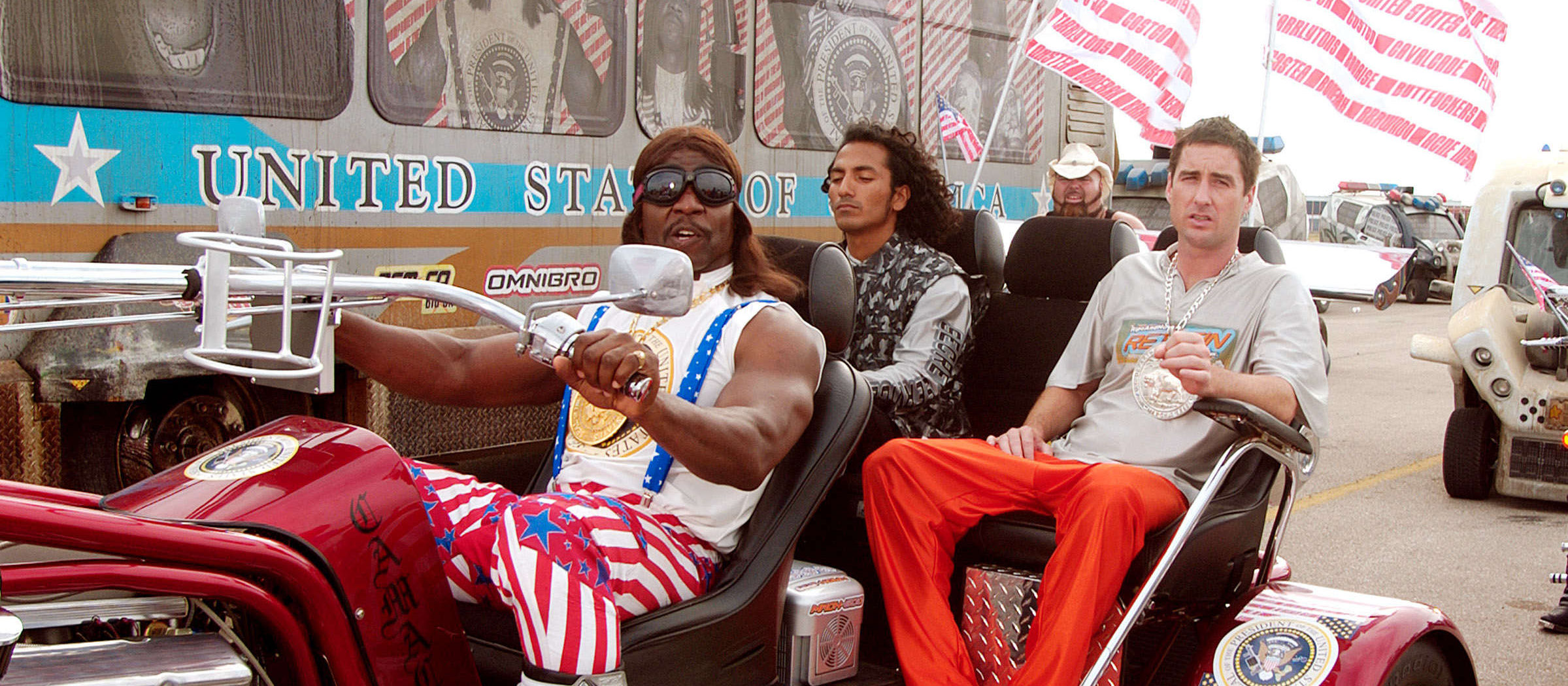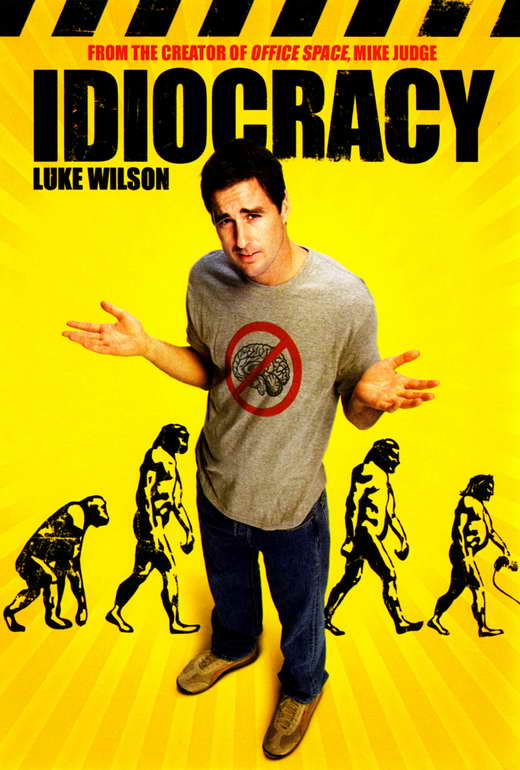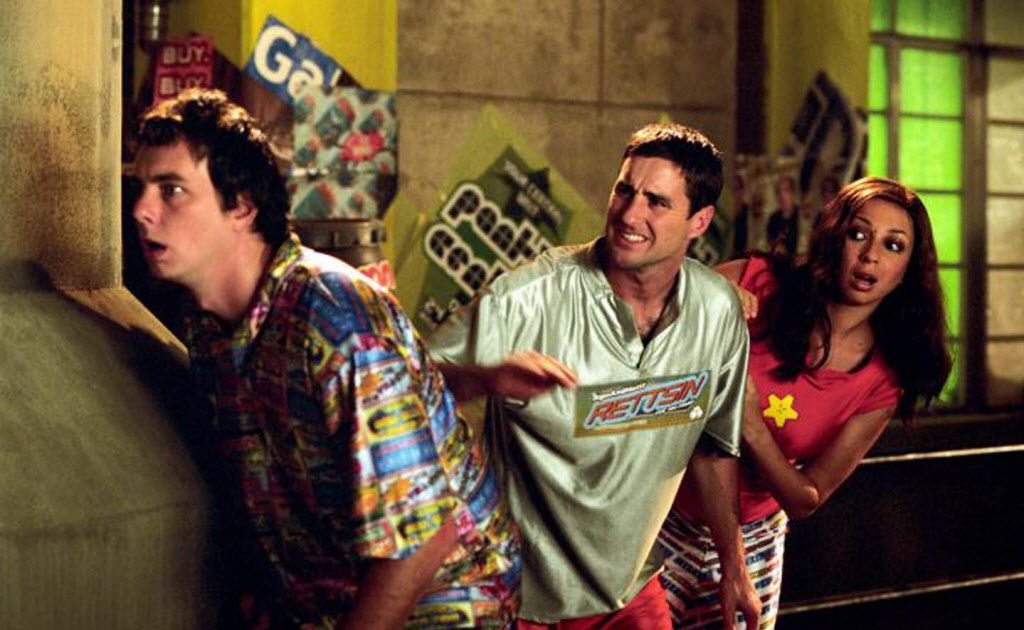

“Water? Like out of the toilet?”
Joe Baeurs (Luke Wilson) is an exceedingly average man; certainly the most average man in the US Army, but perhaps the country and the world as well. Volunteered for a hibernation experiment by his superiors, he’s cryogenically frozen along with a prostitute named Rita (Maya Rudolph) with a promise that he’ll be reawakened in one year. Due to a bureaucratic bungle, the government compound housing their pods is bulldozed to make room for a restaurant and Joe and Rita remain frozen for five hundred years. They are finally roused from their slumber to find an America that has bred itself into indolence and idiocy. Grunting savages roam the streets. The leader of the free world is a former “porn superstar” and professional wrestler named Dwayne Elizondo Mountain Dew Herbert Camacho (Terry Crews). Joe, formerly average in every way, is now the smartest person alive.
In Idiocracy, Mike Judge offers a humorously bleak vision of the future in which civilization has essentially collapsed beneath the weight of cultural decline. The film is superficially dumb—or ‘tarded, as the people of the future will say—so much so that it has often passed as the very thing its satirizing. But if you squint a little bit you can see that it’s also deceptively smart, too, catching those of every political persuasion within its mordant scope and laughing as the world goes to hell in a handbasket. In the years since its extremely limited theatrical release, it’s gracefully aged into a cult film in no small part because its barbed satire has proven figuratively predictive.
During the early 2000s the wealthy intelligentsia chose to procreate less frequently than the impoverished dullards due to various anxieties. Dozens of generations later and the whole of society is in the gutter. Language has devolved into a hybrid of “hillbilly, valley girl, inner-city slang, and various grunts.” A movie that consists of 90 minutes of a bare butt flatulating has won eight Oscars. Frito (Dax Shepard), ostensibly a lawyer, spends his waking hours on a sofa chair with a built-in toilet eating a goopy substance and watching reruns of a crass show called “Ow! My Balls!” which needs no further explanation.
A few gargantuan conglomerates with outsized advertising budgets dominate the corporate landscape; smaller business have survived by offering sexual favors along with their regular goods and services. You can go to law school at Costco or get a handjob at Starbucks—I mean a “gentleman’s latte.” (One of the reasons the film was barely released theatrically is that most of the corporations depicted in it did not realize until it was too late that they were going to be cast in such a negative light.) An energy drink company has purchased the FDA, the FCC, and the USDA, and replaced all water except toilet water with their product, killing off all the crops and creating a dust bowl environment. Outside of the crumbling, grimy cities, mountains of consumer waste obscure the horizon.

But this is not an anxiety-ridden society. Far from it. In this hellish dystopia, obsolete technology—malfunctioning and irreparable but still advanced—has become so all-consuming that attention spans can’t grasp anything beyond sex and food and crude humor. Nor do they need to. As long as their basic needs are met, any additional concerns that these apathetic citizens have are pushed from the mind by endless sensory overload emanating from the screens that occupy every spare nook and cranny. In many respects, these are happy idiots.
All of these caustic tweaks on the banalities of American life create a hilarious background for Idiocracy. And that’s its primary selling point, as it is clear that’s where Mike Judge and co-writer Etan Cohen spent the majority of their creative energy. Indeed, while littered with one liners, site gags, oddball characters, and slack jawed mumbling that will bring low brow laughs, the film hinges entirely on the humor generated by its satirical setting. It is more or less a tour of the zany world that’s been created, with Joe as the audience surrogate and Frito as a guide. If you get caught somewhere between not enjoying the coarse humor and not grasping the broader satire, there’s not a lot going on in terms of character or plot.
There are other elements that lend it charm: the faux educational video narration; the regular use of matte painting backgrounds; memorable cameos from Thomas Haden Church, Justin Long, and Andrew Wilson; Joe’s demolition derby showdown against a wrecker dubbed the “Dildozer.” Judge’s blunt approach to filmmaking, which comes with a low-tech charm, actually undergirds his themes here. But the overriding pleasure in Idiocracy is that Judge doesn’t discriminate with his aim. His jabs are alternately sharp and subtle, and he throws them in every direction. Consider that he’s kind of saying that maybe poor people shouldn’t reproduce. But he’s also attacking materialism and runaway capitalism and laziness and corporatization and government ineptitude and the celebration of moral depravity.
However, his primary critique is beyond politics. Indeed, it’s aimed at the human race in general, or at least modern America and our tendency to pander to the lowest common denominator. Our propensity for dumbing down and elevating the dumbest possible thing as if it is a paragon of quality. He squarely cuts against the notion that humanity is destined for perpetual progress. As MaryAnn Johnson observes in her review at Flick Filosopher, Idiocracy “is a movie that knows how dumb the average person is, and that half of everyone else is even dumber than that.”
All of that considered, perhaps the most fascinating angle from which to approach the film is to consider how its satire is so committed that it almost undercuts the entire thing—the same proximity to subject matter that marks Judge’s previous works like Beavis and Butt-Head and Office Space. There’s plenty of zinging jokes that will make many people laugh, but there’s a braindead texture to the proceedings that might throw the viewer off of the film as a whole. Consider how Frito initially reacts to the freshly-awakened Joe with a flurry of incoherent filth while he distractedly watches a man on television getting whacked in the nuts. Or how Justin Long’s doctor repeatedly and earnestly asks Joe “why come” he doesn’t have a bar code tattoo. Or how President Camacho’s cabinet members cannot fathom that a marketing slogan might not be true. At times, Idiocracy is so close to the subject of its satire that it’s indistinguishable. And if you do find yourself laughing at its vulgar jokes, you’ll soon find yourself the subject of ridicule. I can totally understand why Fox got cold feet, and I can totally understand why it caught on by word of mouth.